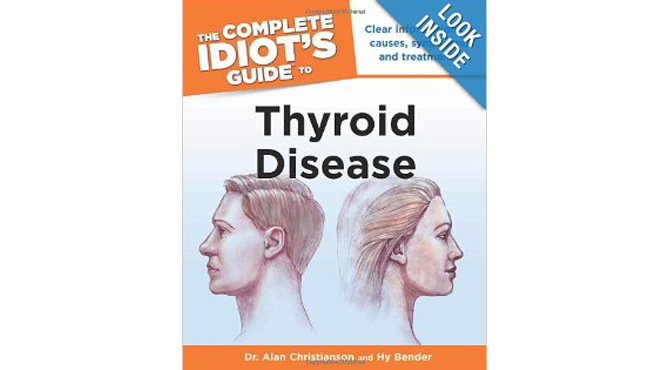January is Thyroid Awareness Month, and so we interviewed Hy Bender, a thyroid cancer survivor and co-author of The Complete Idiot’s Guide to Thyroid Disease with Dr. Alan Christianson, so Hy can share some crucial information you should be familiar with when it comes to your thyroid.
This is Part II in our blog series, and addresses thyroid cancer specifically. To read more about what the thyroid is and does, as well as what thyroid disease is, click HERE. It’s a pleasure to speak with Hy because he answers our question in a way so we can really understand the information, which is always a plus when it comes to all things medical! Read on below.
DASHA®: What is thyroid cancer?
HY: Thyroid cancer is the thyroid disease that causes the most terror. It’s relatively rare, comprising less than 1 percent of thyroid disease cases. It’s on the rise, however, with an increasingly greater number of people being struck every year.
Cancer has a reputation of being deadly and untreatable. Fortunately, that usually doesn’t apply to thyroid cancer, which is about as treatable as cancer gets. The most common thyroid cancers, papillary and follicular, have a cure rate of 97 percent.
DASHA®: What are the symptoms of thyroid cancer, and how is it diagnosed?
HY: There’s a saying among doctors: “If it hurts, it’s probably not cancer.” You can have thyroid cancer and not know it for years, because you’re unlikely to feel it or have it substantially affect your thyroid’s ability to function. In fact, it’s not unusual for someone to die of unrelated causes and be discovered to have thyroid cancer only upon postmortem examination.
The primary sign of thyroid cancer is one or more masses, called nodules, growing on the thyroid. They’re typically noticed when one of them grows big enough to be seen or felt through the throat. A nodule might also call attention to itself by growing large enough to give you trouble swallowing, or by pressing on your vocal nerves to make your voice hoarse.
By age 50, roughly half of us have one or more thyroid nodules; and over 95 percent of the time, these nodules are harmless. But when a nodule grows large enough to be noticed, it’s important to have a doctor check it out for safety’s sake. There’s nothing you can do on your own to evaluate a nodule, so you need to see a doctor. You can start with your general practitioner, or go straight to a specialist—which in this case is an ear, nose, and throat, or ENT, surgeon.
Either way, your doctor will typically perform a manual exam, take some blood to send to a lab for thyroid testing, and then prescribe an ultrasound test. This lets your doctor see what’s going on inside your throat by bouncing high-frequency sound waves off your thyroid (similar to how bats and submarines use sound to navigate). You shouldn’t hesitate to agree to the latter, as it’s relatively quick, inexpensive, and safe.
Alternatively, your doctor might prescribe a radioactive iodine uptake scan, which involves taking a tiny amount of radioactive iodine. The radiation will “light up” whatever absorbs it, and the only things in your body that absorb iodine are thyroid cells. If a nodule shows up as “hot,” it absorbed the iodine and is probably responsible for your having too much thyroid hormones. If a nodule is “cold,” however—meaning it’s not absorbing the iodine and making no hormones—that’s cause for suspicion, as some types of cancer cells don’t use iodine and produce nothing except more cancer cells. About 10 percent of “cold” nodules turn out to be cancerous.
If your ultrasound or uptake scan leaves room for suspicion of cancer, the next step is seeking out an ENT surgeon with long experience and a great reputation for diagnosing and, if necessary, dealing with thyroid cancer. This ENT will typically perform a fine needle aspiration biopsy. This involves taking a very thin—and relatively painless—needle attached to a syringe and sticking it into your throat, aiming for every major nodule on your thyroid (usually based on the ENT feeling its location, or sometimes with the aid of an ultrasound machine). The samples from your biopsy will be sent to a cytopathologist, who’s an expert at evaluating minute clues about cells.
DASHA®: How is thyroid cancer treated?
HY: If cancer cells are detected from your biopsy, then you’ll typically be scheduled for surgery to remove your thyroid.
About a month after that, you’ll usually be given a dose of radioactive iodine. Because your thyroid is the only part of your body that absorbs iodine, the iodine will be ignored by the rest of your body and be soaked up only by whatever thyroid cells remain post-surgery—including all the cancer cells—and the radiation will obliterate them.
At that point you’ll be living without a thyroid. However, taking natural thyroid medication such as Nature-Throid or Armour (either alone, or in combination with a synthetic medication such as Synthroid) first thing every morning will provide you with the hormones that your thyroid otherwise would’ve made for your body.
DASHA®: You are a survivor of thyroid cancer. Please share your experience with members of the DASHA® community.
HY: My diagnosis followed the process just described. The only complication was that my biopsy was inconclusive, which happens 10-15 percent of the time. My ENT surgeon felt there was enough reason to suspect cancer for me to undergo surgery for a closer examination.
I was nervous, since the thyroid is near both the vocal chords and the parathyroids (small glands that regulate the body’s supply of calcium), so if anything went wrong with the surgery the consequences could be serious. But I agreed to the procedure…and it turned out I had cancer throughout my thyroid. The ENT removed my entire thyroid on the spot.
About a month later, another doctor specializing in radiation gave me a dose of radioactive iodine. The iodine was absorbed by all the stray remaining thyroid cells, destroying them…and killing what was left of the cancer.
Since then I simply take thyroid medication—a mix of Nature-Throid and Synthroid—in the form of two pills first thing every morning to replace the hormones that used to be made by my thyroid.
I’m careful to take the pills with nothing but water, and to wait an hour before consuming anything else, to ensure the thyroid hormones enter my bloodstream without interference.
Otherwise, I live a normal life.
DASHA®: Why did you write your book?
HY: The vast majority of thyroid disease cases are extremely treatable.
Typically the biggest danger for someone who has symptoms of thyroid disease is a lack of up-to-date and accurate information—because, unfortunately, many doctors fail to diagnose thyroid disease properly, test for it thoroughly, interpret lab results optimally, and/or prescribe the best type of medication for it.
At the same time, there’s a lot of bad information competing with the good on the Internet.
That’s why I co-wrote The Complete Idiot’s Guide to Thyroid Disease with Dr. Alan Christianson, one of the most respected thyroid doctors in the world, with over 15 years of experience treating thousands of thyroid patients. Dr. Christianson has trained numerous doctors in his techniques for thyroid care, and other doctors refer patients to him when they’re stymied by a thyroid issue. That’s in part why he was named “Top Doc” in 2011 by Phoenix Magazine, and has been a guest on such TV programs as The Today Show and The Doctors.
If you read our book, you’ll be empowered with knowing the dozens of different thyroid disease symptoms to look for, precisely what tests to request and why, how to read your lab results, the advantages and disadvantages of various thyroid treatments, and how you can proactively double-check what your doctor tells you to make sure you’re receiving the finest thyroid care possible.
To learn more, visit CIGThyroid.com.
Stay tuned for when Hy raffles off a copy of The Complete Idiot’s Guide to Thyroid Disease to one lucky member of the DASHA® community later this month!
DASHA® wellness & spa is a luxury lifestyle brand and New York City-based wellness center created to offer a truly holistic approach to wellness. To learn more, visit dashawellness.com.






